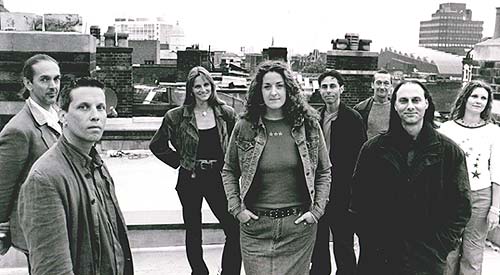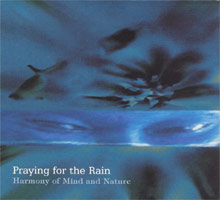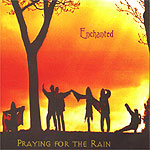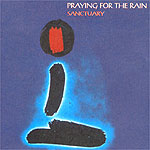BAFA © 2010. All material here is copyrighted. See conditions above. |
Praying for the Rain
Dominic DeCicco, Vincenzo DeCicco, and other musicians, U.K.
|

left
to right: James Dehaan-drums, Malcolm Darwin-bass, Vanessa
Vine-didgeridoo, Delagh
King-vocals and percussion, Vince
DeCicco-accordion, vocals, Paul
Sax(back)-fiddle Domenic DeCicco (front)- lead
vocal, guitars, flutes, Amanda
Easton-percussion, vocals.
|
|
|
Enchanted
Red Tree
stands alone on hallowed ground
watching over grey stone
in loving memory of all souls gone
sleeping in their greenhouse
Birdsongs whistling stories passing time
a stranger passes forever
nameless to the season
like water pouring donw the tunnel
that holds life so dear... (excerpt)
|
|
|
Sanctuary, 1996
Recorded live in St. Paul's Church Hammersmith on the full moon, September 9th, 1995.
A benefit concert for HIV, which helped to raise money for the River House and Oxfam projects.
Dominic DeCicco -vocals, guitar, flute, hand drum
Vincenzo DeCicco - accordion, vocals, djembe
Delagh King -vocals, percussion
Malcolm Darwen -bass, vocals, percussion
Amanda easton -djembe, percussion
James Dehaan -tabla, percussion
Paul Sax -violin
Jem Friar -didgeridoo, overtones, percussion
Vanessa Vine -didgeridoo
Thomas Christen -sax, kalimba
Michael Ormiston -jaw's harp, ocarina, khoomii overtones
John Mead -tibetan bowl
Cover art: Dennis Dracup
|
For orders contact Twin Arrows Music, 510 Brixton Road, London, U.K., SW9 8EN
fax: 00 44 2072745519
www.twinarrowsmusic.com
|
Interview with Vince DeCicco
Our band, Praying for the Rain, is a collective of many wonderful souls with unique and inspiring abilities. It consists of the following musicians:
Domenic DeCicco: lead vocal, guitars, native flute and percussion.
Vincenzo DeCicco: accordion, keyboards, vocal harmony and rainstick.
Amanda Easton: djembe (African drum), darabouka (Egyptian drum), chimes and percussion.
Delagh King: vocal harmony, bodhran (Irish drum) drum and triangle.
Malcolm Darwen: bass, vocal harmony and bodhran (Irish drum).
Vanessa Vine: didgeridoo; Paul Sax: violin; James DeHaan: drums.
The name "Praying for the Rain" is about change and giving thanks for the life force that sustains us all. It is derived from a song about our ancestors, who were brought up on the land.
|

|
The story of the band began in the early 1990s, when Domenic (my brother) and I (Vince) traveled to London with a guitar, an old drum machine and a few suitcases. We wanted to find something new musically. Born in Canada to Italian parents, Europe represented the change we were looking for.
Left to Right:
Vince and Domenic de Cicco.
|
In 1992 we released the acoustic album October Moon, with guitar, accordion and two voices. It contained songs about the earth and our ancestors and drew mainly on Celtic and a gentle songwriting influence.
About the same time, we began going to a club called the Troubadour. It was a famous club in the 60's for the likes of Simon and Garfunkel and Bob Dylan and now attracts the new acoustic movement. Here we met the core of the present group, including Delagh, Malcolm and Amanda. At this time, Domenic and I also met our didgeridoo player, Vanessa Vine, at a meeting place in Covent Garden, where musicians networked ideas and alternative life choices. In 1994, the band recorded the album Journey, which was about traveling and spiritual landscapes. By this time, we were moving away from traditional styles and creating a bridge to our future sound.
|

|
In February 1995, a friend suggested we do a benefit concert for River House, a support group for people with HIV. We hired St Paul's church, a grand gothic cathedral in Hammersmith, and had the concert recorded. On the full moon in September that year, we also performed the live album Sanctuary to an audience of 500 there.
We were beginning to see that sacred spaces could raise the energy of a performance through colour, sound, smell, chanting and dancing. For this concert, the space and those involved in it were first cleansed in a Native American ritual that involved burning the herb, sage, which had been tied up in a bundle. Amanda used an eagle's feather to smudge each of us, lightly stroking the smoke with the feather around each of our bodies (aura or energy field). During the performance, we used frankincense, candles, and visuals on two separate screens behind the band. The visuals were a combination of still slides (painted on the slide, with themes of tribal shapes and vibrant colours) and live vision mixing of images from places such as Mongolia, Eastern Europe, Italy and India. Everyone worked together, sharing love and positive energy to create beauty. We shared this with the audience, raising the energy inside the sacred space.
Since then, we have performed in many churches. In 1996, we played in the Union Chapel in London. This was a benefit evening for Mongolian Buddhism - the Russians destroyed all but four of the temples - through the Tibet Foundation. This connected us to another group of people and style of music. The event was organized by Michael Ormiston, who sings "Khoomii" - that is, overtoning or singing two notes simultaneously.
n 1999, we played a summer solstice concert in St. James's church, the heart center of London. Recently, Domenic and I played during the meditation for Commonwealth Day at Westminster Abbey. This was a brief performance with didgeridoo player, David Couthard. The silence and space, though there were over 1000 people in the Abbey, created the most profound sensation of peace and stillness I have ever experienced in a performance. You could almost hear the sounds of all our minds in the stillness, and certainly a pin drop!
In October this year, we performed at the Union Chapel again to a sold-out audience. This was a positive affirmation for us, because it seemed as if the whole London alternative healer, organic community of souls attended and participated.
We feel very supported in London. It is an exciting place and it inspires us to create and share. We have found our spiritual home here - with the music, art, community of healers, organic food, and many cultures in one space. Brixton, where we live, has many cultures, Caribbean, Muslim, Hindu, White, a huge vegetable market, artists, clubs and so on all living in one community. This is a world experiment in tolerance and understanding on a large scale. It works!
We have transformed our homes into sacred places that reflect the inner tranquility of our lives. The studio in Brixton is perfect because it over looks the main High Street, and covers well for the music we make. It is non-stop traffic. But inside the flat (the second floor is the office and studios adjacent) is peaceful. Also, the energy of all the musicians who have shared their music and helped in the collective resonates there. As brothers, Domenic and I have real family together, but the band has become a part of our wider family.
The band has also performed at many festivals, mainly around Europe. At the Kingston Green Fair, Glastonbury, we performed on stages run by solar and wind power. This opportunity gave the band a chance to participate in the change in consciousness brought about by the new millennium. We believe that creating the society we want for future generations is our responsibility.
In January 2000, we traveled to Algiers to take part in the Millennium of El Djazair Beni Mezghenna festival, which included artists from Africa, the Middle East and Russia. It was amazing; we were the only western artists invited. The music spoke beyond language and the message of peace and hope for the future nurtured everyone's soul. A curfew had been lifted two weeks earlier, which allowed everyone to dance freely for the first time in 10 years.
During our 1999 tour of Italy, we performed to a packed audience at the Big Green Gathering, Europe's largest environmental festival, at which over 10,000 attended. The festival was run totally by wind and solar power, including the music, the cafes and support structures for the entire festival. It was a real vision for a possible future.
In September we appeared at Mora, an international environmental festival in Dubrovnik, Croatia, put on to raise awareness for the preservation of the Adriatic Coast. The band also brought its energy to the Shantipi Festival in Israel, which was focused on peace and bringing together Arab and Israeli musicians.
Over the past couple of years, Domenic and I have participated in documentary and film. In 1999, we wrote music for the documentary Flight of the Condor and we appeared briefly in the BSkyB mini-series the Tenth Kingdom. It is a fantasy tale in which the modern world meets the fairy kingdom. Paul Sax, on fiddle, and I, on accordion, appeared briefly in a scene in which we performed around a campfire. It seemed a natural thing for us to be doing, having played in many festivals where, after the performances, musicians gathered round the campfire to play, sing and tell stories. I believe it is important to preserve our connection to the ancient past through oral tradition.
Most of the work we do for documentaries and film is an extension of the sound and energy we put into our own music. Domenic and I have been working so closely together over the years that we create a musical space or vibe and, in this way, arrive at what the directors and producers are looking for. Generally, our music is Native American in theme and both planned and spontaneous.
The intent of the music the band produces is to raise energy through the sounds and feeling that come from each of us. We use instruments from different cultures to form our own sound, always respecting the ancient ones. Storm, the first track on the Enchanted CD (1999), starts off with a bull roar, which is like an Aboriginal (Australia) rope on a stick. When spun through the air with human hands, it creates a vortex or rushing wind sound. This is the moment before the storm when animals and plant life go silent in expectation. It is followed by the didgeridoo. Again Aboriginal in origin, it was traditionally played only by men. However, Vanessa has played it for many years. Last year in London, she was given the blessing of an Aboriginal elder. It was important for her to know it was fine in their eyes for a woman to play this sacred instrument.
Some say it has been played for 100,000 years or more!
At the beginning of the song Light is fire, the gentle sounds of the mbira (African thumb piano) drift, followed by the drone of the accordion. The mbira was traditionally used for walking great distances. It sets a rhythm and puts the walker into a type of trance. The song also uses the pulse of a Native American hand drum from New Mexico, which is joined by djembe, bodhran and other hand drums. Each piece has a story and is related to the place and its people. The djembe was traditionally played by men, while the women danced. Amanda was taught to play it by Henri, a master drummer from the Ivory Coast in West Africa. Times are changing; in the West, men and women are drumming together to heal themselves.
We like to sing and chant simple prayers in harmony, with influence from Gregorian chants and Indian mantras. At the end of one chant, the rain sticks provide the pulse. These are bamboo cylinders filled with corn kernels following in a spiral. When turned over, they create a watery rain sound. They were brought to us from a friend in Ecuador, where an elder in a village makes them by hand. One song ends with the aboriginal flute, from the New Mexico area. First Nation music has influenced us because Domenic and I were born and raised around the Canadian Great Lakes. It has the spirit of the freedom they experienced as a race, and through the timbre of Domenic's voice, flute and drum, their voice is strongly heard.
Some of the songs rely more on songwriting. These songs come from places and feelings about them. Red Tree was written under a tree in a cemetery on a sunny day and is about souls finding rest. Underwater features the sounds of Tibetan bowls filled with water, creating a shimmering effect. The bowls are found in the Himalayas and originate in Buddhist temples in northern India and Tibet. They can be as old as 6th century AD, though many have been made this century. The song was written at St Donats Castle in Wales and is about a group of sailors that went down off the coast. It contains Celtic dance features, the didgeridoo and violin. Again, a mixture of traditional Irish influence, with African and Aboriginal instruments. We have also done a remix of Underwater. It is an expansive piece, setting a different mood by changing the harmonics of the violin to a fifth and shaping the voices in such a way that they roll with the waves.
As the Skies Turn is a song for hope and peace through love, in the new time we are entering. Played simply with guitar and cello, it is a prayer for understanding:
 In the days ahead where will you run for comfort In the days ahead where will you run for comfort
When the skies turn red will we see it coming
As the flame burns out it's taken by another
Hold on to the one you love
Harmony of Mind and Nature is our latest CD, which was recorded on one of the busiest corners in the world in Brixton, where the vibrant buzz of the city is matched with a celebrated mix of multi-cultural life. The album makes use of samples that reflect that urban landscape, interwoven with evocative lead vocals and delicately rendered acoustic instruments such as Tibetan bowls, didgeridoo, darabouka, djembe, flutes, violin, guitars and accordion. The stories within the songs touch on poignant themes like birth and regeneration and the quest for balance between the forces of mind and nature. The acoustic guitar and accordion on which the songs are written are western, but are often used with Middle Eastern and Indian influence.
Recent journeys to Algeria and Croatia and a highly charged visit with a tribal elder in Canada contributed to the album's unique spirit.
Aurora is a song written for a (now) two-year-old who was in the womb when it was written in 1999. Her father arrived during the evening of a concert. We put the digital image of the child at one day old on the screen, and played a cassette recording of her heartbeat. It was an unforgettable moment as birth, technology, and especially love shared in the creation of life. The lyrics reflect the sensation of living before birth. There is a sample of her heartbeat on the recorded song. Here are a few lines from the song:
Inside this cocoon I call the sky
Warmth and love,
I arrive through water
It's raining on my head
I'm alive, I am dead
Is there a difference
I can touch that touches me
I arrive through water
Bab El Oued ("at the gates of the river") is a song about religion and how if God is one, then he/she must be the same one for Muslims, Christians, Jews and so on. We must allow people to find and commune with God in whatever way they choose. Bab El Oued is a district in Algiers where we played the first of four concerts in the festival. It is a busy area, and our bus was parked on the side of the street in the rush hour. We stood there, strangers in a foreign land, with our guides and bodyguard, when suddenly I heard a beautiful voice over the loud speakers. It was the call to prayer. We were filming the journey, so I got a sample of the call, and the song was written almost instantly in my mind. We used the key of the voice to record the song. The theatre we performed in was run down, because the country is very poor, and had no running water. That evening we played to about 100 enthusiastic people. By the fourth concert, word had spread and we sold out the main auditorium (about 600 people). What a memory - the people were warm and just wanted peace and to live a life with family and to prosper. A few lines:
Open hearts and open arms
No running water at the gates of the river
We meet our friends on common ground
Music in one language at Bab El Oued
A gentle voice, a call to prayer
To remind us all that God is everywhere,
Stop all the noises in my head
And listen to the voices at Bab El Oued
Grandmother's Bones is a song about the ancestors. Not long ago, my father phoned from Canada and he told me they were moving my grandmother's bones from her gravesite in Italy. The reason is that in Italy a space is hired for 15 years and then the body is taken to a new space (to be hired) to make way for another body. It got me thinking that she no longer rested next to her husband. I imagined her life and how hard it was in rural Calabria, southern Italy. I gave the song a happy ending, with her resting next to my grandfather, whom I was named after. Here are a few lyrics:
They're moving grandmother's bones from where they lie,
Where her spirit once rested for a moment,
Rented space for fifteen years,
Waiting for another soul to transmigrate
Leaving the earth, to feed, to regenerate
At the moment, we are working on a library album for KPM (in London), in collaboration with a South African producer, Robin Hogarth. The music is Native American in style, with a combination of traditional and our own compositions. The sound of the album will be contemporary, but again respect for the tribes is always in our minds. We are using guitars and vocals that will incorporate Mongolian Khoomi throat singing, Bulgarian throat singing and a choir. Also we will be adding cello, violin, Tibetan bowls and many other global sounds to reflect the oneness in the music of all cultures, including classical music. It is an exciting project. The music will be used for mainly documentaries.
Finding the funds to continue the collective has been a challenge, but it works through community co-operation and trust in the universe. We have wonderful people working with us and, through the spirit of giving, we all survive and prosper. The members of the band are involved in many projects that compliment the music. Domenic and I work full-time with the company Twin Arrows Music, which we set up in 1997. It has been a brilliant experience so far. Each day, we do the administration, record, produce and market the label. Our music is available primarily from our website (www.twinarrowsmusic.com), but also from specialty shops across the UK. We are also linking to an Australian internet company called Music A La Carte, who distribute sacred trance and world music. The idea is to connect with the rest of the world through the net and thereby share ideas, information and music. Also we have agents in Italy, Ireland and now Canada, who are helping to bring us to the worldwide audience out there.
In spring 2002 we are going to Ireland, then Italy and Canada in the summer, Croatia in the autumn. Add to this our shows in London, and various festivals in the UK, it is a
blessed life we have created for ourselves and we give thanks for this.
Arts Dialogue, February 2002, pages |

Arts Dialogue, Dintel 20, NL 7333 MC, Apeldoorn, The Netherlands
email: bafa@bahai-library.com
|
|





 In the days ahead where will you run for comfort
In the days ahead where will you run for comfort